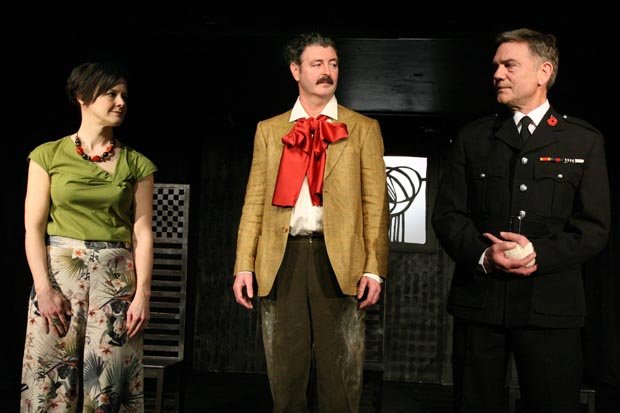“People fall quicker than buildings do, you have to decide which comes first” – The Beautiful South
When Rob Drummond sat down to write The Mack, he can’t have imagined that Notre Dame would burn down the week before it played at the Trav, re-igniting a debate that is at the heart of this play – which is more important: buildings or people?
We in Scotland have been there with that one. Twice. Glasgow School of Art’s iconic building burnt in 2014 and 2018, and Drummond’s play introduces us to two fictionalised – a disclaimer at the beginning is keen to stress that – participants in events: the fire crew chief who led his men into the burning building in 2014, and an American design historian faced with the near complete loss of her beloved Mack in 2018.
We also meet the main man, Charles Rennie Mackintosh, the celebrated designer who was himself a graduate of the art school that would eventually be housed in his building.
The three sit in high backed Mackintosh chairs, independently delivering their thoughts to the audience from their own separate times. For Mackintosh, this means reading aloud the real life letters he sent to his wife Margaret while he was apart from her in the South of France, with their distinctive sign-off: “MMYT – My Margaret, Your Toshy”. For the other two, the situation is more confusingly fluid. The design expert is seemingly in a session with a counsellor, the fireman at a press conference, but that conceit doesn’t hold for long – they fall in and out of it, ultimately addressing their thoughts to no-one in particular.
The trio remain independent voices for most of the duration of the play. Linguistic cues bridge between speakers – Mackintosh will bemoan eating alone, for instance, and the design expert will share her own tale of solo dining – but these links are surface level only, a baton-passing that does little to bond the characters together. More often, interchanges feel jumpy and fractured. One will offer a snippet of a thought before another takes over, each on a parallel track. Their threads start separately and never really intertwine as satisfyingly as one might suppose.
For sure, they have things in common. All have mental health troubles – Mackintosh, we’re told, possibly had bipolar disorder, the fireman probably PTSD, the expert is grieving and depressed – but that doesn’t feel enough to tie them together beyond their circumstantial connection – a shared link to a building. There’s little sense that the soul of the place has seeped out and bonded the three on a deep level across time and space.
The expert (Janet Coulson) plays a narrator of sorts, selling the beauty of The Mack to us and expounding on its creator in the style of a hagiographic blog or an enthusiastic teacher. Coulson convinces as an academic, and John Michie (the fire chief) is ever reliable in the kind of public-servant-with-demons role in which he excels. The actor has faced a very recent personal tragedy himself of course, which must give him a difficult perspective on his character’s inner turmoil about the value of life, even if one doesn’t wish to read too much of the man into the role.
By far the most interesting character, though, is Mackintosh himself. James McAnerney brings some fabulous emotional dynamics to Toshy’s letters. It’s hard to tell how much of the vivid character that emerges is really present in the bare text of the letters and how much is a work of imagination, but McAnerney, under the direction of Jack Nurse, certainly makes it feel real. His boredoms and joys and depressions aren’t just dry letters to home, they’re meaningful life events we feel present at. The funny, likeable character our design expert is slightly in love with comes through strongly.
There’s not enough of that wit and soul in this piece. However much the fictionalisation is stressed at the outset, it plays like verbatim theatre, with characters doing lots of telling us how they think and feel, and not leaving much space for the audience to build up their own impressions. The Mack is clearly worthy of theatrical homage, but this one could be a little less literal.
